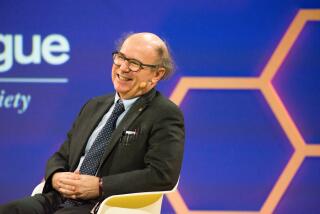Books : Isaac Newton’s Life Isn’t an Exact Science for Historians
- Share via
Let Newton Be! A New Perspective on His Life and Works, edited by John Fauvel, Raymond Flood, Michael Shortland and Robin Wilson (Oxford University Press: $29.95; 272 pages; illustrated)
Modern science is exactly 302 years old. We can date its start with precision, for it began with the publication of Newton’s “Principia Mathematica” in 1687.
Isaac Newton invented both physics and calculus, either one of which would have assured him an honored place in history. “Principia Mathematica” revolutionized humanity’s view of the cosmos. More important, it created the scientific way of looking at the world. In short, it revolutionized thought.
Newton created an orderly way for examining experience and learning from it. He applied the rigor of Euclidean geometry to the motion of the planets around the sun, to optics and, ultimately, to the entire universe. He showed that the same laws governed falling objects on Earth and celestial bodies in the sky.
As Sir Hermann Bondi, the British cosmologist, writes in this excellent collection of essays honoring Newton:
“His solution of the problem of motion and the solar system was so complete, so total, so precise, so stunning, that it was taken for generations as the model of what any decent theory should be like, not just in physics, but in all fields of human endeavor.”
The Newton Legacy
The Newtonian way of knowing--a perfect system based on a small number of axioms and theorems provable from them by logic--continues to be the ideal of knowledge long after Newton’s physics has been supplanted by Einstein’s and long after people should have learned better.
“Newton gave us so singular an example of perfect prediction, of a perfect solution,” Bondi writes, “that this mirage still impresses us too much.”
Nor was that all Newton did. Besides his scientific work, which included important writing in mathematics, physics, optics, harmonics and chemistry, Newton also wrote extensively on alchemy and theology.
All of these interests and then some are discussed and analyzed in “Let Newton Be!,” a dozen essays on various aspects of Newton’s life and thought that range in tone from scholarly to popular.
Life of a Genius
Newton was a very unusual man, and not just by virtue of his scientific achievements. He was born in 1642 and lived to be 85 years old but never married or, according to his own testimony, had sexual relations of any kind.
He suffered a mental breakdown in his early 50s, after which he left Cambridge, went to London, became warden of the Mint and did no important scientific work for the rest of his life. Nonetheless, when he died in 1727, Britain proclaimed him a great national hero.
The authors of the essays in this book, all important historians or historians of science in their own right, attempt to assess the substance of Newton’s contributions as well as his enduring importance.
John Roche, a British physicist and historian, puts the matter succinctly: “There may have been minds gifted with greater powers and vision than Newton outside the exact sciences,” he writes. “But, within those sciences, from antiquity to the present, no greater mind is surely to be found.”
A Cultural Context
It is not altogether clear, however, what is the “new perspective” on Newton that is mentioned in the subtitle of this book. The essays that deal with Newton’s many scientific activities do not seem to break much new ground, though they are very good expositions of their topics.
The essays with broader themes, which place Newton in his cultural context then and now, are probably the best in the book. Among this group are articles by Derek Gjertsen, a philosopher and historian of science; Maureen McNeil, a cultural historian of science, and Bondi, whose concluding essay on “Newton and the 20th Century” is the most thought provoking of the lot.
Bondi argues that one of Newton’s greatest skills was the ability to distinguish soluble problems from insoluble ones. He estimates that 80% of all problems that one encounters every day are insoluble. Another 19 1/2% are soluble but trivial. Important science, he says, is done on the remaining one half of 1% of problems that are soluble and non-trivial, and important scientists are the practitioners who can spot them.
His Greatest Skill
Bondi says that this was Newton’s greatest skill. Thus, confronted with reams of physical data, Newton was able to separate two questions: (1) Given the positions, velocities and masses of the bodies of the solar system, where will they be in the future, and where have they been in the past? and (2) Why do the bodies of the solar system have these particular masses, positions and velocities?
The first question was soluble, and Newton’s solution, as noted, changed the course of science and of knowledge itself.
The second question, which concerns the origin of the solar system and the universe, is one that could not be answered in Newton’s time and still cannot be answered with any degree of certainty today.
Newton wisely left aside the second question, choosing instead to concentrate on what could be answered rather than on what couldn’t.
But in the process he left the world with the impression that most scientific problems could be solved, which turns out not to be the case. Only in our own time have we come to the grudging realization that most of science is more like predicting the weather than the velocities of falling bodies.
Newton’s accomplishments were monumental, but they are not the whole story.
More to Read
Sign up for our Book Club newsletter
Get the latest news, events and more from the Los Angeles Times Book Club, and help us get L.A. reading and talking.
You may occasionally receive promotional content from the Los Angeles Times.









